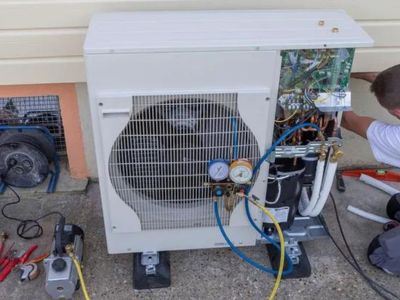Common Questions About Heat Pumps
Air conditioners and furnaces last a long time, so there isn’t much of a need to shop around very often. While this means that homeowners don’t have to deal with the headache of replacing their HVAC system very often, it does mean that their knowledge of HVAC systems may be outdated when the time comes. In recent years, heat pumps have become popular choices for heating and cooling a home. Here is a quick guide about heat pumps to help keep homeowners current on the latest heating and cooling options for their homes.
What Is a Heat Pump?
A heat pump system can be used to both heat and cool a space by transferring heat from one location to another. During heating, a heat pump extracts heat from the outdoors, even at very low temperatures, and transfers it indoors to heat the building. Conversely, during cooling, it removes indoor heat and transfers it outside to cool the building. It operates similarly to an air conditioner but can also provide heating functionality.
Heat pumps come in different types depending on what source they use to pull heat from. The different kinds of heat pumps are:
- Ground source heat pumps or geothermal heat pumps that extract heat from the ground.
- Air source heat pumps are the most common type of heat pump system that transfers heat from the air.
- Water source heat pumps that use a water source instead of the outside air for heat.
What Are the Benefits of Installing a Heat Pump?

Heat pumps are gaining in popularity because they are excellent choices for heating and cooling. Some of the advantages of heat pumps are:
- Energy Efficiency: Heat pumps are highly efficient, especially in moderate climates, as they move heat rather than generate it, resulting in lower energy consumption.
- Dual Functionality: They can both heat and cool spaces, providing year-round comfort with a single system.
- Lower Operating Costs: Since they utilize electricity to move heat rather than generate it, they can be more efficient, which results in lower energy bills, especially in regions with mild winters.
- Environmentally Friendly: Heat pumps produce fewer greenhouse gas emissions compared to systems relying on fossil fuels like natural gas or oil.
- Zone Control: Some heat pump systems, like ductless mini split heat pumps, allow for zoning. This enables different areas of a building to be heated or cooled independently, enhancing comfort and energy savings.
When Are Heat Pump Repairs Needed?

When it comes to keeping a heat pump running, besides routine maintenance, repair must be done when issues arise. The signs of trouble are typical of most heating and cooling systems. Homeowners should call for heat pump repair when the following signs are noticed:
- Poor air quality
- Temperature or airflow problems
- The system is stuck in one more, whether heating or cooling
- Short cycling
- High energy bills
- New, strange noises
About Elite Electric, Plumbing & Air
Elite Electric, Plumbing & Air has been serving Jupiter, FL, and the surrounding areas since 1988. They offer 24/7 emergency service, upfront pricing, and personal attention. Call them today for heat pump installation and repair in Jupiter, FL.

